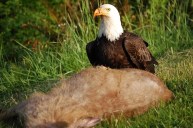The U.S. Fish & Wildlife Service announced a pilot program for this year's fall hunting season in which the agency will reimburse hunters for using lead-free ammunition on certain federal lands.
"This pilot program and the lessons learned will be critically important in determining our best approach to managing lead use by outdoor recreationists on refuge lands and waters," said Martha Williams, the director of the Fish & Wildlife Service, in a statement. She added that the goal of the program is to minimize "the impacts to wildlife from lead exposure."
According to the announcement, those who participate in the voluntary program will need to submit proof of purchase and in return, they'll receive a prepaid debit card for the cost of the ammo. While the agency has not yet outlined all the specifics of the program, it has listed seven locations where hunters can participate. The locations include:
- Patoka River NWR in Indiana - Deer hunting
- Blackwater NWR in Maryland - Deer hunting
- Wallkill River NWR in New Jersey - Hunting for all species
- Pocosin Lakes NWR in North Carolina - Deer hunting
- William L. Finley NWR in Oregon - Elk hunting
- Canaan Valley NWR in West Virginia - Hunting for all species
- Trempealeau NWR in Wisconsin - Deer hunting
Why lead-free ammo
The use of lead-free ammunition has been a hotly debated issue. Supporters of lead-free ammo — or rather, critics of lead ammo — argue that scavengers like the endangered California condor will eat the entrails left over after a hunted animal has been gutted. In turn, they will incidentally consume the lead projectiles used to kill the animal and subsequently suffer from lead poisoning. While opponents of such changes dismiss the argument, saying there's not enough evidence.
In the announcement, eight wildlife and hunting groups expressed support for the pilot program. The list includes the Congressional Sportsmen's Foundation, which has historically opposed lead ammo bans. The group's president and chief executive, Jeff Crane, explained that his organization supports the program because it's not a mandate.
"As a member of the Hunting and Wildlife Conservation Council, we appreciate the Fish and Wildlife Service launching a process where hunters can make their own determination as to what type of ammunition they prefer while afield through voluntary, non-regulatory approaches," he said.




